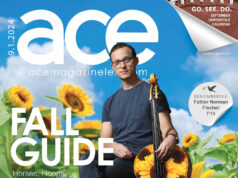[two_third]
Deep Thoughts

So why does the university want me to do research? My last two points answer this question. (3) Graduate students aren’t attracted by how proficient professors are at talking to a room full of students; they’re attracted to – you guessed it – how good the research is that the professor does. As Toreki (the sucky researcher who was denied tenure) points out at the end of the article, UK won’t become a top 20 public university without getting good graduate students. (4) Believe it or not, research is intrinsically valuable. This is probably obvious for fields like chemistry, but it even holds for philosophy: there’s something to be said for having a few members of society spending time thinking about life’s deep questions. And if we get any answers, we’ll be sure to tell our students.
Bradley Monton
via email
In “Teaching or Tenure?” [cover Aug 24] it might have escaped Steven Tweddell that this is a dilemma that fazes every top research university in the country. I received my undergraduate degree at Texas A&M University, and the professors there certainly faced a great deal of publishing and research pressures. I appreciate Tweddell’s attempt to foment controversy, but that’s life at a research university.
While I am sure that Dr. Toreki is a fine instructor, there are plenty of community colleges and liberal arts schools where he can devotedly ply his trade of teaching. If students want professors who are fully devoted to them, they can attend one of the many liberal arts schools and smaller state universities around the country. (There’s one right next door to UK, I believe).
While Dr. Toreki takes “full responsibility,” he sheepishly makes sure that others share in the blame with him (grad students and the Commonwealth). Dr. Toreki knows his pact with UK in which he admits, “I certainly was there to do reseach.” He certainly didn’t fufill that and that is why he is not there anymore. Very simple. Why this non-story is your cover story or even merits any pages in ACEWeekly escapes me completely.
Benjamin Cheng
via email
I’m a non-traditional student at UK, and work 20-30 hrs a week, so my education is taking a little longer then most. I have been attending UK for the past three years and have noticed a drastic change in that time. I find more TA’s teaching classes, understandable english optional, professors repeating coursebooks word for word with no additional insights, and little or no interest if you are understanding the key concepts of a course. Your article was dead on in UK’s shift from teaching to research. I would like to point out that there is a difference between a teacher and a professor. A professor is someone who has mastered their field of interest. A teacher is someone who can share that knowledge with their students. We don’t require professors to take any kind of formal training as a teacher which most need in the worst way. A great article.
T Butler
via email
[/two_third][one_third_last]
Paging Dr. Staff
The ability of states and nations to cultivate an appetite and an appreciation for knowledge will be key to their prosperity.
-Exploring the Frontier of the Future, Kentucky Long-Term Policy Research Center
Given that Kentucky will pony up a scoche more than a billion dollars to higher education this year (give or take some spare change), all taxpayers have a right and responsibility to occasionally figuratively slit open the corpulent white belly of our flagship university and poke around its metaphorical guts.
Last week’s cover was intended to generate some discussion to that end.
As this week’s mail points out, of course the “publish or perish” phenomenon is not unique to the University of Kentucky. Of course, it is not new to UK. Teaching is prioritized at liberal arts colleges (if you can afford the freight), not the big schools. And of course, research is, and must be, a major part of the mission of any top university. It is vital, valuable work. We did not and would never suggest otherwise.
Dr. Robert Toreki wasn’t offered up as a modern Joan of Arc. He was, by all accounts, an outstanding teacher. And he was, by his own admission, not a great researcher (which is what UK hired him to do). He failed to meet his objectives, and he paid the price with his job. Then he found another one. It’s not exactly the stuff of Greek tragedy.
But we do think this scenario -and its larger implications- merits discussion.
Just how is UK planning to achieve the claims of its ludicrously embarrassing ad campaign as “the NEXT great university” (which must make anyone currently spending tuition dollars there feel like a real chump)?
Maybe there is room for improvement when a student doesn’t have any meaningful interaction with a real professor until they’re halfway through their undergraduate education. Take a look at the course catalog. That Dr. Staff is one busy guy. Are TA s and instructors qualified to provide such a substantial portion of a student’s college education?
And that’s just the tip of UK’s proverbial iceberg.
Unloading a president who oozed up from the community college system will be a start.
Finding a new ag dean (a policymaker role in Kentucky), who can reconcile the danger factory farming poses to our way of life with the fact that we have an agrarian economy that still relies too heavily on fading tobacco, will be pivotal.
Retaining our best undergrads, as opposed to shipping them off to the “good schools” for graduate work, should be addressed.
Raising admissions standards every year is an important objective, as is providing a culturally diverse environment (despite the fact that the state gave UK a free pass a few years back on their failure to achieve mandated affirmative action goals).
And somewhere in all this, maybe there’s still room for a few good teachers.
In 1997, Governor Patton stood on the steps of the capitol, flanked by beaming children and legislators, and signed the Higher Education bill. “I see a new Kentucky rising in the dawn of the 21st century. A Kentucky committed to progress, a Kentucky committed to change, a Kentucky committed to excellence. Excellence in quality of life, excellence in economic opportunity, and excellence in education.”
Meanwhile, less than a third of Kentucky’s population is educated beyond the high school level.
The jury’s still out on KERA, and how it’s preparing the state’s kids for careers and college.
And in Change magazine’s recent profile of research institutions, UK doesn’t even place on most of the charts.
A national report card on higher education will be released this fall, and it will be interesting to see how Kentucky rates in this new assessment.
Maybe it’s not fair to ask Patton, “are we there yet?” It’s only been three years. And the governor did acknowledge it might take awhile, “I dedicate myself to this end so long as the people of Kentucky allow me to hold this office and even beyond, so long as God lets me stay on this earth.” And it’s true he is still in office and he is not dead yet.
But are we even close? Or are we still contenting ourselves with the rallying cry of the 70s, “Thank God for Mississippi”?
It’s not much, but it still sounds better than the “next great University.”
[/one_third_last]




